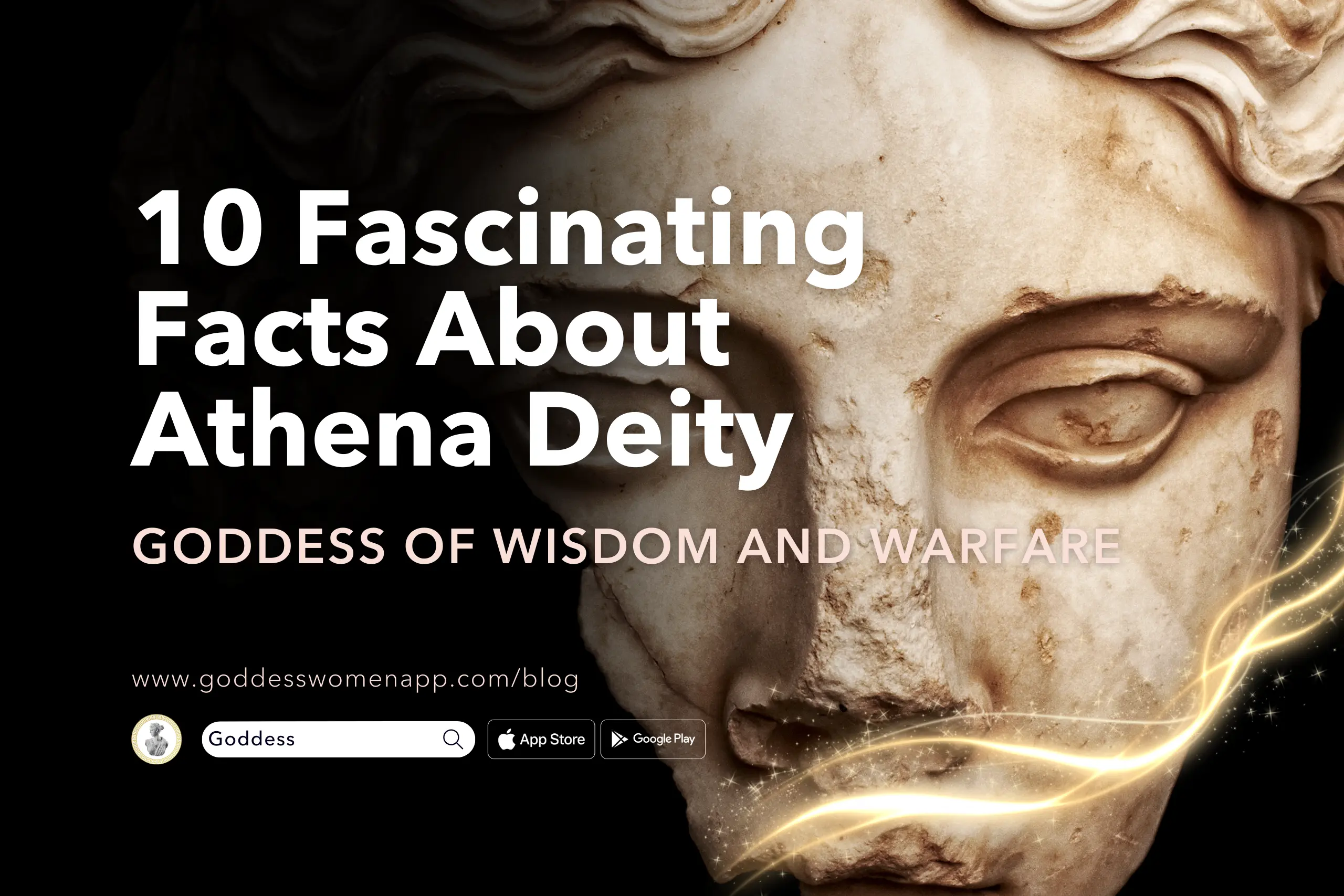Table of Contents
Introduction
In the grand tapestry of Greek mythology, few figures captivate the imagination like Athena deity, the Goddess of Wisdom and Warfare. Known for her intelligence, strategic prowess, and martial might, Athena holds a prominent place among the Olympian gods. Born from Zeus’s head, she burst forth fully armored and wielding a spear, embodying wisdom, strategy, and the power of the warrior goddess.
A symbol of strategic warfare rather than mere blood lust, Athena is recognized for guiding Greek heroes like Odysseus, Perseus, and Hercules to victory. As the patron goddess of Athens, she bestowed the olive tree upon the city, a gift that secured her role as protector and brought peace, prosperity, and wisdom to its people. The ancient world revered Athena for her intellect and innovation, celebrating her influence in arts, crafts, and strategy.

1. Athena Deity’s Unique Birth
Athena’s birth is one of the most unique and intriguing tales in Greek mythology. It begins with Zeus seeking to prevent a prophecy that warned of his downfall by swallowing Metis, his first wife. Despite his attempts to thwart fate, Metis was already pregnant. As a result, Zeus suffered an enormous headache and, with the aid of Hephaestus, had his head split open, allowing Athena to spring forth in her full armor, symbolizing the warrior goddess.
This event cemented Athena‘s role as the goddess of wisdom and warfare. She was revered as a pre-Hellenic goddess, often linked with household crafts, military prowess, and strategy. As one of the three goddesses involved in the legend of the golden apple, Athena showcased her wisdom and restraint in contrast to the vanity of Hera and Aphrodite.
Her association with wisdom earned her the title of Athena Polias, the patron goddess of Athens. The city honored her with the Parthenon, a magnificent cult statue of Athena Parthenos that stood as a testament to her divine status. Unlike the Roman goddess Minerva, Athena maintained a close bond with the Greek cities that revered her.
In her divine form, Athena is often depicted as a beautiful woman with gleaming eyes. Her wisdom and modesty were admired, and she was believed to have guided young women in household crafts and in maintaining their sexual modesty. Modern scholars recognize her significance as a symbol of strategic warfare and wisdom, highlighting her influence that extended far beyond the Trojan Acropolis and into the modern world.

2. Athena and the City of Athens
As the war goddess and goddess of wisdom, Athena played a pivotal role in the history and mythology of ancient Greece. Among her many epithets, she was honored as Athena Polias, the patron goddess of Athens. The ancient Greek capital was named after the goddess Athena following her victory over the sea god Poseidon in a legendary contest.
The tale begins with Poseidon and Athena competing to offer the greatest gift to the city, hoping to become its divine protector. While Poseidon struck the earth and brought forth a saltwater spring, Athena presented the city with the olive tree, a symbol of peace and prosperity. The city’s rulers chose the olive tree as the greater gift, marking the goddess Athena as their patron goddess.
In gratitude, the Athenians built the Parthenon, a grand cult statue that stood on the Acropolis, showcasing Athena Parthenos in all her splendor. Athena‘s influence extended beyond war and strategy to include arts, crafts, and wisdom. Her divine wisdom and ingenuity guided Athens to thrive as a center of culture and knowledge in the ancient world.

3. Athena and Pallas Athena
Pallas Athena, another of Athena’s epithets, stems from a tragic story in Greek mythology. According to early myths, Pallas was a young woman and close companion of Athena. The two trained together in the arts of warfare, honing their skills as warrior goddesses. However, during a sparring match, Athena inadvertently killed her friend due to an unexpected intervention from Zeus.
Devastated by the loss, Athena took on the name Pallas as a mark of respect for her dear friend, becoming known as Pallas Athena. In her divine grief, she fashioned a statue named Palladium, which was said to protect Greek cities and was believed to safeguard the Trojan Acropolis during the Trojan War.
In her role as goddess of wisdom, Athena guided heroes like Odysseus in Homer’s Odyssey and aided Hercules in his labors. She became a foster mother of sorts to Greek heroes, teaching them not just military prowess but also cunning strategy and wisdom.
The beautiful woman with gleaming eyes was frequently depicted in full armor, a nod to her martial aspect. Her story, deeply woven into the fabric of ancient Greece, continues to inspire modern scholars, who view Athena as a symbol of wisdom, strategic warfare, and innovation that resonates far beyond the ancient myths.
4. Athena’s Role in Greek Mythology
Athena, the Greek goddess of wisdom and warfare, played a significant role in Greek mythology. As the daughter of Zeus, who swallowed Metis to prevent her from bearing a child, she was born when Zeus’s head was struck open, and she emerged fully armored. Revered as a warrior goddess and a protector of Greek heroes, Athena guided them with her wisdom and strategic prowess.
As a formidable figure among the Olympian gods, Athena held a unique position as the goddess Athena of strategic warfare and wisdom. Her influence is seen in the myths of ancient Greece. She guided Odysseus with wit and cunning in Homer’s Odyssey, offered protection to Perseus in slaying Medusa, and aided Hercules in his labors. The Greek cities looked to Athena for guidance and worshiped her as the patron goddess of Athens.
Her wisdom extended beyond warfare to influence various arts and household crafts, embodying the spirit of innovation in the ancient world. Athena’s role was not just limited to war but encompassed peace, justice, and civilization. In the contest for Athens, Poseidon struck the ground to offer a saltwater spring, while Athena offered the olive tree to symbolize peace and prosperity.

5. Athena’s Symbols and Representations
As a goddess of wisdom and strategic warfare, Athena is richly represented in art and literature. She is often depicted with her gleaming eyes, wearing her full armor and carrying a spear and shield. The Roman goddess Minerva, though modeled after Athena, does not capture the unique complexity of her Greek counterpart.
Athena’s symbols include the olive tree, which she offered to Athens, representing peace and prosperity. The owl, associated with wisdom, became a standard motif on silver coins in ancient Greece. She was also depicted with a snake, symbolizing renewal and protection.
Her shield, the Aegis, adorned with the head of Medusa, symbolized her fierce protection and power. The cult statue of Athena Parthenos stood in the Parthenon as a testament to her divine authority. In addition, the golden apple from the myth of the Judgment of Paris highlighted her role as one of the three goddesses who vied for the title of the fairest.
Pallas Athena is another name that honors her as a protector, a nod to the tragic loss of her companion, Pallas. Her military prowess is demonstrated through her strategic support for heroes in their quests and battles. Modern interpretations of Athena emphasize her intellectual prowess, integrity, and resilience, qualities that made her one of the most revered figures in Greek mythology.
6. The Parthenon: Athena’s Temple
In ancient Greece, the Parthenon stands as the most iconic tribute to Athena, the goddess of wisdom and warfare. Positioned on the Acropolis of Athens, it was built during the 5th century BCE and dedicated to Athena Parthenos, one of her prominent epithets. As the patron goddess of the city, Athena was celebrated in a grand temple that showcased her significance in Greek mythology.
Within the Parthenon stood a towering cult statue of Athena Parthenos, crafted by the sculptor Phidias. The statue’s divine form was overlaid with gold and ivory, symbolizing the glory of Mount Olympus. The Parthenon itself featured sculptural reliefs depicting various myths, including Athena’s birth from Zeus’s head and her legendary contest with Poseidon, who had struck the earth to create a saltwater spring.
This grand temple embodied Athena’s role as a warrior goddess and protector of the city, showcasing her strategic importance to the people of Athens. The Parthenon was not only a religious monument but also a testament to the political and cultural power of Athens in the ancient world.

7. Athena and Wisdom
Athena, the Greek goddess of wisdom, holds a significant place in mythology and the hearts of the ancient Greeks. Known for her keen intellect and military prowess, Athena guided heroes and young women alike in various domains, embodying the ideals of wisdom and strategic warfare.
As Pallas Athena, she was revered for her strategic prowess and insight. She invented many crafts that benefited both individuals and society, and her wisdom extended to guiding Greek heroes in their quests. In Homer’s Odyssey, Athena helped Odysseus navigate his long journey home. She was also a foster mother of sorts to Hercules, assisting him in several of his legendary labors.
The Homeric Hymns often describe Athena as the goddess of wisdom who champions justice, peace, and strategy over mere blood lust. She played a crucial role in the tale of the golden apple, where her wisdom set her apart from the other goddesses. Modern scholars acknowledge Athena’s influence as one of the most important deities in Greek mythology, symbolizing intellect, innovation, and strategy.
8. Athena and Warfare
In Greek mythology, Athena stands out as the warrior goddess who embodies strategic warfare, preferring intelligence and planning over brute force. As a goddess of wisdom and war, her influence on the battlefield was characterized by cunning, leadership, and tactical skill. Unlike Ares, the god of war who was driven by rage and mere blood lust, Athena brought reason and clarity to the chaos of battle.
Athena was widely respected for her tactical brilliance and often supported Greek heroes in their quests and battles. In the epic Trojan War, she played a significant role in guiding the Greeks to victory. She offered advice to Odysseus, whose cunning strategy of the Trojan Horse, influenced by Athena, led to the Greeks overtaking the city of Troy. Her guidance of Perseus in slaying Medusa and Hercules in his labors further emphasized her strategic prowess. She helped these heroes not just through direct intervention but by equipping them with the wisdom to overcome their challenges.
As Pallas Athena, she was also associated with defensive warfare, symbolizing the protection of the city and its inhabitants. She was known as Athena Polias, the patron goddess of Athens and protector of the city. She offered the olive tree as a symbol of peace, contrasting the sea god Poseidon‘s saltwater spring, showcasing her preference for wisdom over violence.
The Roman goddess Minerva, modeled after Athena, inherited many of her traits, yet it was Athena who remained the quintessential war goddess in Greek mythology. As a daughter of Zeus, Athena embodied both the might of the chief god and the wisdom of her mother, Metis, whom Zeus swallowed in an attempt to prevent a prophecy from coming true. The result of this unusual circumstance was the Olympian goddess Athena, whose birth from Zeus’s head was a testament to her unique position in the pantheon.

9. Athena in Art and Literature
Athena, the goddess Athena of wisdom and strategic warfare, has been an enduring subject in art and literature throughout the ages. In ancient Greece, she was depicted in sculptures, frescoes, and pottery, often shown in her full armor with gleaming eyes. The cult statue of Athena Parthenos in the Parthenon, crafted by Phidias, is one of the most iconic representations of her divine form. Adorned in gold and ivory, the statue stood as a testament to Athena’s importance in Greek cities and their religious practices.
In early myths, Athena is described in the Homeric Hymns and epics like Homer’s Odyssey, which paint her as a cunning strategist who offers wisdom to those in need. Her role as a foster mother to heroes like Perseus and Hercules is highlighted in various myths, showing how Athena guided these Greek heroes with her intelligence and foresight.
In the ancient world, Athena was also featured on silver coins and other artifacts, symbolizing the city’s dedication to their patron goddess. The golden apple myth, where three goddesses—Hera, Aphrodite, and Athena—competed for the title of the fairest, reflects her wisdom and humility, emphasizing the characteristics that distinguished her from her peers.
The influence of Athena extended beyond the pre-Hellenic goddess traditions into the Roman era, where her counterpart Minerva became a significant deity. Even modern scholars recognize Athena’s role in shaping perceptions of wisdom, strategy, and warfare, with her legacy evident in contemporary literature and art.
The Greek goddess continues to inspire modern representations, often portrayed as a beautiful woman in full armor, symbolizing the unification of wisdom and strength. Her story is not just a tale of mythology but a timeless representation of intellect, strategy, and the pursuit of justice.
10. Athena’s Legacy in Modern Times
The legacy of Athena, the Greek goddess of wisdom and warfare, extends far beyond the ancient world and continues to influence modern culture. As a warrior goddess and the goddess of wisdom, she embodies a unique blend of intellect and strategic prowess, qualities that resonate strongly in today’s society. Athena’s role as the protector of Greek heroes and Greek cities highlights her significance as a guardian of justice and civilization.
In contemporary literature and popular culture, Athena is often depicted as a symbol of strategy and reason. Her representation in books, films, and art underscores her timeless appeal as a deity who embodies wisdom and strength. Modern interpretations of Athena often focus on her intellect, making her an enduring symbol of strategic thinking and justice.
The archetype of Athena as the patron goddess of Athens is reflected in various leadership qualities seen in modern leaders and strategists. She is the embodiment of the balanced approach to conflict resolution, favoring strategic solutions over mere blood lust. Her influence extends to empowering young women, who look to her for inspiration in their pursuit of wisdom, strength, and independence.
Her image as a beautiful woman clad in full armor, with gleaming eyes and holding a shield and spear, represents her vigilance and readiness to defend those under her protection. Even in today’s modern world, Athena’s symbolism endures, representing the virtues of wisdom, courage, and justice.

Conclusion
Athena remains one of the most influential figures in Greek mythology, her legacy continuing to inspire generations. From her birth from Zeus’s head to her role as the goddess of wisdom and warfare, her influence permeates the myths of ancient Greece and the modern world alike. As Pallas Athena, she represented the strategic and intellectual approach to warfare that set her apart from other Olympian gods.
Her impact on Greek heroes like Odysseus and Hercules underscores her pivotal role in guiding humanity toward justice and wisdom. The cult statue of Athena Parthenos and the Parthenon in Athens stand as testaments to her enduring legacy as a patron goddess.
In modern times, Athena’s legacy is visible in the continued celebration of wisdom, strategy, and empowerment. Her image serves as a powerful reminder of the virtues of intellect and justice.
To discover if you embody the qualities of this war goddess, take the Goddess app’s archetype quiz and find out if you possess the traits of the Athena goddess archetype.





